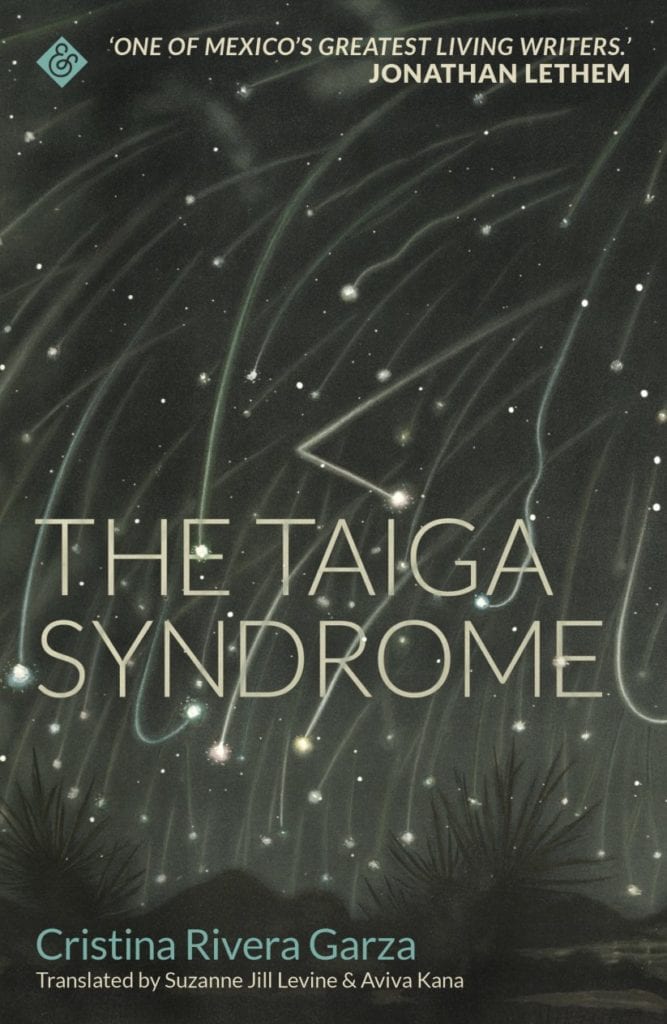The Taiga Syndrome
By Cristina Rivera Garza, Suzanne Jill Levine (translator)

A fairy tale run amok, The Taiga Syndrome follows an unnamed Ex-Detective as she searches for a couple that has fled to the far reaches of the Earth. A betrayed husband is convinced by a brief telegram that his second ex-wife wants him to track her down – that she wants to be found. He hires the Ex-Detective, who sets out with a translator into a snowy, hostile forest where strange things happen and translation serves to betray both sense and the senses. The stories of Hansel and Gretel and Little Red Riding Hood haunt the Ex-Detective’s quest into a territory overrun with the primitive excesses of capitalism – accumulation and expulsion, corruption and cruelty – although the lessons of her journey are more experiential than moral: just as love can fly away, sometimes unloving flies away too.
About The Author: Cristina Rivera Garza
Cristina Rivera-Garza is the award-winning author of six novels, three collections of short stories, five collections of poetry and three non-fiction books. Originally written in Spanish, these works have been translated into multiple languages, including English, French, Italian, Portuguese, and Korean.
Read an Excerpt
That they had lived there, they told me. In that house, there. And they pointed it out with an apprehension that could easily be mistaken for respect or fear. Their fingers barely peeked out from the cuffs of their heavy black coats. The smell of ash under their arms. Dirty nails. Dry lips. Their eyes, having discreetly moved toward where they were pointing, quickly returned to their original position, gazing straight ahead. “What are you really looking for?”—they asked without daring to say so. And I, who didn’t exactly know, followed their steps like a shadow, back to the village over snow-covered trails.It wasn’t really a house, I should say first. I would have described what I saw on that morning, at the beginning of autumn, as a shack, maybe not even. A hovel. In any case, it was a habitable structure made from wood, card-board, and lots of dry branches. It did have a roof, a ridged roof, and a pair of windows covered in thick transparent plastic instead of glass. It had the air of a last refuge. It gave the impression that beyond was only open space, the law of the wilderness, and the sky, so blue, so high, above the wild. I remember the cold. Above all, I remember the cold. I remember my clenched jaw, fists deep in my coat pockets.They had arrived there, according to my information, at the beginning of winter. I had come to that conclusion because their last communication came from a telegram office in a border town about two hundred kilometers away. The telegram, addressed to the man who had hired me to investigate the case, said briefly and somewhat obliquely that they were never coming back: “whatarewelettinginwhenwesaygoodbye?”I took the case because I have always had an all-consuming weakness for forms of writing no longer in use: radiograms, stenography, telegrams. As soon as I placed my hands on the faded paper, I began to dream. The tips of my fingers skimmed the creases of the paper; the stale smell of age. Something hidden. Who would set out on such a journey? That couple, of course. Out of everyone, only those two. From what place, so far away in space, so far away in time, had this fistful of capital letters been sent? And what were the two of them hoping for?

Continue Reading…
Article originally Published in the October/November 2019 Issue “Read Global”
